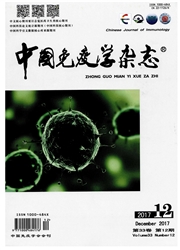

 中文摘要:
中文摘要:
目的:分析HBs Ab滴度〉10 000 m U/ml外周血BCR CDR3受体库的组成及特征,寻找可能的HBs Ab序列,为维持后续研究提供数据基础。方法:提取HBs Ab滴度高于10 000 m U/ml样本的PBMC总DNA,外送美国Adaptive Biotechnologies Immuno SEQ平台行Illumina Solexa高通量测序,用IMGT数据库中的High V-QUEST软件初步分析BCR CDR3受体库IGHV、IGHJ和IGHD基因亚群的分布情况、IGHV-J配对取用情况、CDR3区氨基酸长度分布及氨基酸取用情况,并与NCBI数据库中HBs Ab序列进行比对。结果:实验样本均高频取用基因亚群IGHV3、IGHV4,IGHJ4、IGHJ6,IGHD3、IGHD6;高频取用配对IGHV3-J4、IGHV3-J6。CDR3区氨基酸长度均以14及15个氨基酸长度为中线呈正态分布,高频取用的氨基酸依次为Y、G、D、A、R、S,在107、108、109、113、114位点呈现氨基酸多样性取用,在105、106、115、116、117位点上取用氨基酸保守。与NCBI数据库中HBs Ab序列比对,得到IGHV、IGHJ、CDR3氨基酸长度完全一致的独特序列共48条。结论:HBs Ab滴度高于10 000m IU/ml样本BCR CDR3受体库的组成具备基本一致的特征,获得的48条独特序列为维持后续研究提供了坚实的数据基础。
 英文摘要:
英文摘要:
Objective:To acquire potential HBsAb sequences, we have analyzed the BCR CDR3 repertoire of the peripheral blood with HBsAb titer higher than 10 000 mU/ml, which could provide a data basis for follow-up study. Methods : Genomic DNA of pe- ripheral blood mononuclear cells was extracted from samples with HBsAb titer higher than 10 000 mU/ml. We have adopted Illumina Solexa high-throughput sequencing technology of the Adaptive Biotechnologies ImmunoSEQ platform to acquire sequence data. IMGT/ High V-QUEST was used to preliminary analyze our sequence data,including usage of IGHV,IGHJ and IGHD gene subgroups, IGHV-J matching, distribution of CDR3 amino acid (AA) length and usage of total CDR3 AA. And these sequences were compared with the HBsAb sequences from NCBI database. Results:Experimental samples have highly selected gene subgroups IGHV3, IGHV4, IGHJ4, IGHJ6, IGHD3, IGHD6, and IGHV3-J4 pairing, IGHV3-J6 pairing. The AA length distributions of CDR3 region were normal distribution with the length of 14/15 AA as the midline. In the regard to amino acid usage in CDR3 region, each sample prior used Alanine, Tyrosine, Glycine, Alanine ,Aspartic acid and Serine. The amino acid usages of 107,108,109,113,114 positions were diversified but 105,106,115,116,117 positions taking conservative amino acids usages. We have found 48 unique sequences that have same IGHV, IGHJ and CDR3 AA length with the HBsAb sequences from NCBI database. Conclusion:There were almost the same characteristics of BCR CDR3 repertoire of the peripheral blood with HBsAb titer higher than 10 000 mU/mL The 48 unique sequences provided a solid data basis for the follow-up study.
 同期刊论文项目
同期刊论文项目
 同项目期刊论文
同项目期刊论文
 Comparative analysis of human and mouse immunoglobulin variable heavy regions from IMGT/LIGM-DB with
Comparative analysis of human and mouse immunoglobulin variable heavy regions from IMGT/LIGM-DB with 期刊信息
期刊信息
